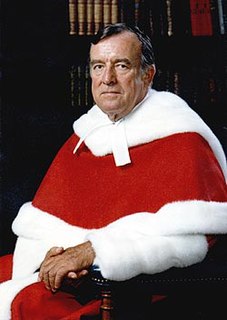
The Supreme Court of Canada is the highest court in the judicial system of Canada. It comprises nine justices, whose decisions are the ultimate application of Canadian law, and grants permission to between 40 and 75 litigants each year to appeal decisions rendered by provincial, territorial and federal appellate courts. The Supreme Court is bijural, hearing cases from two major legal traditions and bilingual, hearing cases in both official languages of Canada.

The chief justice of Canada is the presiding judge of the nine-member Supreme Court of Canada, the highest judicial body in Canada. As such, the chief justice is the highest-ranking judge of the Canadian court system. The Supreme Court Act makes the chief justice, a Crown in Council appointment, meaning the Crown acting on the advice of the prime minister and minister of justice. The chief justice serves until they resign, turn 75 years old, die, or are removed from office for cause. By tradition, a new chief justice is chosen from among the court's incumbent puisne justices.

Beverley Marian McLachlin is a Canadian jurist and author who served as the 17th chief justice of Canada from 2000 to 2017. She is the longest-serving chief justice in Canadian history and the first woman to hold the position.

Joseph Antonio Charles Lamer, was a Canadian lawyer, jurist and the 16th Chief Justice of the Supreme Court of Canada.

Robert George Brian Dickson was a Canadian lawyer, military officer and judge. He was appointed a puisne justice of the Supreme Court of Canada on March 26, 1973, and subsequently appointed the 15th Chief Justice of Canada on April 18, 1984. He retired on June 30, 1990.

Bora Laskin was a Canadian jurist who served as the 14th chief justice of Canada from 1973 to 1984. Laskin was appointed a puisne justice of the Supreme Court in 1970, and served on the Ontario Court of Appeal from 1965 to 1970. Before he was named to the bench, Laskin worked as a lawyer and in academia.
Ronald Martland, was a Canadian lawyer and Puisne Justice of the Supreme Court of Canada. He was the second Albertan appointed to the Supreme Court of Canada, taking the place of Justice Nolan, who died after only a short time on the Court.

R v Khan [1990] 2 SCR 531 is a landmark Supreme Court of Canada decision that began a series of major changes to the hearsay rule and the rules regarding the use of children as witnesses in court. In this case, and subsequently in R v Smith (1992), R v B (KG) (1993), R v U (FJ) (1995), R v Starr (2000), and finally, R v Khelawon (2006), the Court developed the “principled approach” to hearsay, where hearsay statements can be admitted if they are sufficiently reliable and necessary.

R v Keegstra, [1990] 3 SCR 697 is a freedom of expression decision of the Supreme Court of Canada where the court upheld the Criminal Code provision prohibiting the wilful promotion of hatred against an identifiable group as constitutional under the freedom of expression provision in section 2(b) of the Canadian Charter of Rights and Freedoms. It is a companion case to R v Andrews.

R v Askov, [1990] 2 S.C.R. 1199, is a 1990 appeal heard before the Supreme Court of Canada which established the criteria and standards by which Canadian courts judge whether an accused's right to a speedy trial under the Canadian Charter of Rights and Freedoms, Section 11(b) "to be tried within a reasonable time" has been infringed.
The Supreme Court of Canada was founded in 1875 and has served as the final court of appeal in Canada since 1949. Its history may be divided into three general eras. From its inception in 1875 until 1949, the Court served as an intermediate appellate court subject to appeal to the Judicial Committee of the Privy Council in Britain. Following 1949, the Court gained importance and legitimacy as the court of last resort in Canada, establishing a greater role for the Canadian judiciary. In 1982, the introduction of the Canadian Charter of Rights and Freedoms significantly changed the role of the Court in Canadian society, by providing the Court with greater powers of oversight over Parliament and through formal recognition of civil rights including aboriginal rights and equality rights.

Duke v R [1972] S.C.R. 917 was a decision by the Supreme Court of Canada on the Canadian Bill of Rights, concerning the right of an accused to make full answer and defence to a criminal charge.
Justices of the Supreme Court of Canada have the option of releasing reasons for a unanimous decision anonymously by simply attributing the judgment to "The Court". The practice began around 1979 by Chief Justice Laskin, borrowing from the US Supreme Court practice of anonymizing certain unanimous decisions. Unlike in the US, which uses it primarily for uncontroversial cases, in Canada, it is used almost always for important and controversial cases.

Richard Wagner is a Canadian jurist serving as the 18th and current chief justice of Canada since 2017. He previously served as a puisne justice of the Quebec Court of Appeal (2011–2012) and of the Supreme Court of Canada (2012–2017). For several months in 2021, following Julie Payette's resignation as Canada's governor general, Wagner was the administrator of the government of Canada as well as chief justice.
This page is based on this
Wikipedia article Text is available under the
CC BY-SA 4.0 license; additional terms may apply.
Images, videos and audio are available under their respective licenses.







